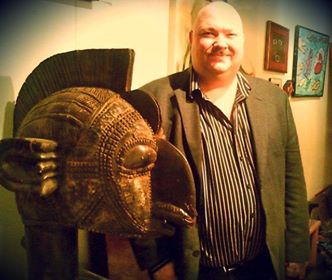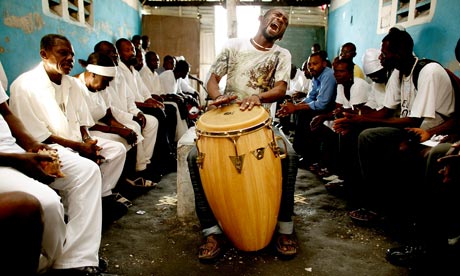In July 2014, the Guardian interviewed Haiti’s first Roman Catholic cardinal, Chibly Langlois, in which he described Vodou as a “big social problem” that leads its followers to supernatural solutions and, as Langlois claims, illegitimate avenues for solutions. In Haiti, Vodou was outlawed until 1934 and is currently (as of 2003) considered an official religion. Despite the cardinal’s pronouncements, Vodou remains strong.
Historian Tony Kail, author of “A Secret History of Memphis Hoodoo: Rootworkers, Conjurers & Spirituals,” countered the cardinal’s views on the negative impact Vodou has upon the communities that practice it. Kail has been cataloguing African Traditional Religions in the Southern United States for almost 30 years.

Tony Kail [courtesy]
In speaking to Chibly’s opinions as stated in the article, Kail said,
There are a lot of assumptions here. The first being that Vodou offers no solutions to a country deprived of justice and a political voice. The religion has provided solutions and a political voice for millions of Haitians throughout the years. The assumption that poverty forces Haitians to seek supernatural solutions speaks of the bias against the religion. What about impoverished communities where Catholicism flourishes? Would the same be said for the Catholic religion?
Vodou is a syncretic religion that emerged from the traditional religious practice of the enslaved people brought from West Africa, principally Dahomey. The word mean “spirit” in the Fon language. In Haiti, the original religious practice was suppressed by the Catholic church. But African slaves continued to practice secretly and Haitian Vodou emerged.
Vodou has its original roots in the concept of a “lakou,” which were communities created after the Haitian rebellion so that groups of families could survive in the mountains together. The forbidden practice of Vodou became a mix of the Catholicism that the French colonists imposed upon their slaves (both African and the native Taino people) and a mixture of several faiths brought over from Africa.
Kail spoke about how much of an important impact Vodou has among the communities that practice together. “Vodou celebrates and honors African traditional religion as it preserves cultural and ethnic pride. The religion recognizes the importance of ancestral wisdom and continues a lineage that can be traced back to Africa.”
Vodou has served its followers with obtaining justice and healing through skilled herbalists. Also, practitioners have used it to connect with their ancestors and their creator god named Bondye to which the followers worship through interacting with intermediary spirits called collectively the Lwa.
Bondye is an unknowable mystery of a creator god, who is removed from humanity, which is why followers call upon different lwa to assist them depending upon what they need. The faith provides a strong connection between its followers in a community, unlike what the cardinal stated.
Langlois is quoted as saying, “If a person is well educated and has the financial means, they will go to a doctor [instead of the voodoo priest] when they get sick. If that same person went to the court to get justice they would not go to the voodoo priest to get revenge. It’s a big problem for the church. And for Haiti.”
Kail countered the cardinal’s statement. “Traditional healers in the Vodou community can provide healthcare with a cultural understanding of their clients. Healers can engage client beliefs in the magical and spiritual causation of sickness and disease. Matters of justice can be addressed in the spiritual realm, thus in some cases avoiding physical violence or retaliation among communities.”
Kail gave further insights about how essential Vodou has been in the modern health practices that have been open to it.
“The notion that only uneducated masses visit traditional healers is very ethnocentric. There are numerous practitioners of the Vodou faith from all walks of life, Haitian and non-Haitian. Here in the US, traditional healing in the Vodou community is recognized by several prestigious medical organizations such as Boston University’s School of Medicine’s ‘Healing Landscape Project’ which has coordinated workshops where American physicians could learn cultural and health-related practices from healers in the Haitian Vodou community.
Hospitals in cities like Miami utilize cultural brokers from the Haitian Vodou community to assist patients that are practitioners. Numerous professional organizations throughout the world acknowledge the complex botanical knowledge of Vodou’s traditional healers. There are several educated individuals who recognize and subscribe to the beliefs and practices of Vodou.”
Misunderstandings and fear have plagued Vodou and has been played up by those who opposed it. For example, common non-practitioners believe that a “voodoo doll” is a device used to curse. It was historically a way to denote a patient’s ailments for when they would return to receive healing. The skilled herbalist and practitioner could pull out the appropriate doll for the patient and see what issues the person had with a glance.
Kail stated, “In 2019, there are some ‘open eyes’ that have finally recognized that Vodou is a legitimate religion, however there are still many that believe many superstitious fantasies about the faith. Years of propaganda and misinformation based on racism and fear have certainly left a mark on how we view not just Vodou, but several African religious traditions.”

Haitian Vodou Ceremony (Photo: Chip Somodevilla/Getty).
The rituals where the devout would allow themselves to be “ridden” (temporarily possessed) by the lwa have been played up by Hollywood to scare those who don’t understand how they work. The ritualistic dancing and drumming help create an ecstatic state that allows the participants to open themselves up to be ridden so people may ask for help, wisdom, and assistance in dealing with issues they want to petition the lwa for.
Part of the misunderstandings about Vodou, as the cardinal stated, is “That’s why voodoo ceremonies are conducted at nighttime. They are ashamed to say they practice it.”
Kail explained, “The notion that Vodou ceremonies are only practiced at night because practitioners are ashamed of the religion is also quite an assumption. Devotees practice the religion and conduct sacred rituals at many different times of the day. The suggestion that there is ‘shame’ regarding the religion speaks more about the cardinal’s worldview in my opinion.”
There are many who mix their Catholicism and Vodou or include Vodou in their other spiritual practices despite what the cardinal tries to discourage.
Langlois stated, “The church cannot – and does not – ignore the cultural elements and uses of voodoo, like the drum, the rhythm, the way of singing. But you can’t be voodooist and Catholic. The Catholic should be pure Catholic; the voodooist should be pure voodoo.”
Kail’s perspective is that Vodou has a central role in many practitioners’ lives despite also following other faiths.
“There are specific theological debates that occur between devotees and outside observers regarding ‘dual membership’ in Vodou and Christianity. The Vodou religion recognizes numerous spirits and forms of magic which sometimes clashes with the beliefs of those with monotheistic and anti-magical beliefs.
Some hold the belief that you must choose one or the other. In some African traditions, the incorporation of Christianity with African religion served as a cultural survival as in the practices of Regla de Ocha in Cuba. There are also communities that have embraced spiritual traditions from many different sources.
Several years ago when I was in Kenya, I met a woman who maintained a shrine in her home that contained elements from African and Catholic spiritual traditions. When I asked her about her shrine, she explained that it was all spiritual and helpful to her.”
Despite centuries of oppression, Vodou remains vibrant. Next week, we share practitioner perspectives.
The Wild Hunt is not responsible for links to external content.
To join a conversation on this post:
Visit our The Wild Hunt subreddit! Point your favorite browser to https://www.reddit.com/r/The_Wild_Hunt_News/, then click “JOIN”. Make sure to click the bell, too, to be notified of new articles posted to our subreddit.